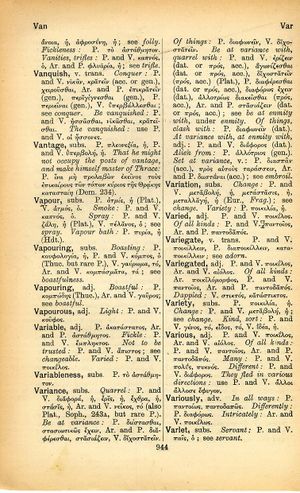variance
ἀσκέειν, περὶ τὰ νουσήματα, δύο, ὠφελέειν, ἢ μὴ βλάπτειν → strive, with regard to diseases, for two things — to do good, or to do no harm | as to diseases, make a habit of two things — to help, or at least, to do no harm
English > Greek (Woodhouse)
substantive
quarrel: P. and V. διαφορά, ἡ, ἔρις, ἡ, ἔχθρα, ἡ, στάσις, ἡ, Ar. and V. νεῖκος, τό (also Plato, Soph., 243A, but rare P.).
be at variance: P. διίστασθαι, στασιωτικῶς ἔχειν, Ar. and P. διαφέρεσθαι, στασιάζειν, V. διχοστατεῖν.
of things: P. διαφωνεῖν, V. διχοστατεῖν.
be at variance with, quarrel with: P. and V. ἐρίζειν (dat. or πρός, acc.), ἀγωνίζεσθαι (dat. or πρός, acc.), διχοστατεῖν (πρός, acc.) (Plato), P. διαφέρεσθαι (dat. or πρός, acc.), διαφόρως ἔχειν (dat.), ἀλλοτρίως διακεῖσθαι (πρός, acc.), Ar. and P. στασιάζειν (dat. or πρός, acc.); see be at enmity with, under enmity.
of things, clash with: P. διαφωνεῖν (dat.).
at variance with, at enmity with.
adj.: P. and V. διάφορος (dat.).
alien from: P. ἀλλότριος (gen.).
set at variance, v.: P. διασπᾶν (acc.), πρὸς αὑτοὺς ταράσσειν, Ar. and P. διιστάναι (acc.); see embroil.

